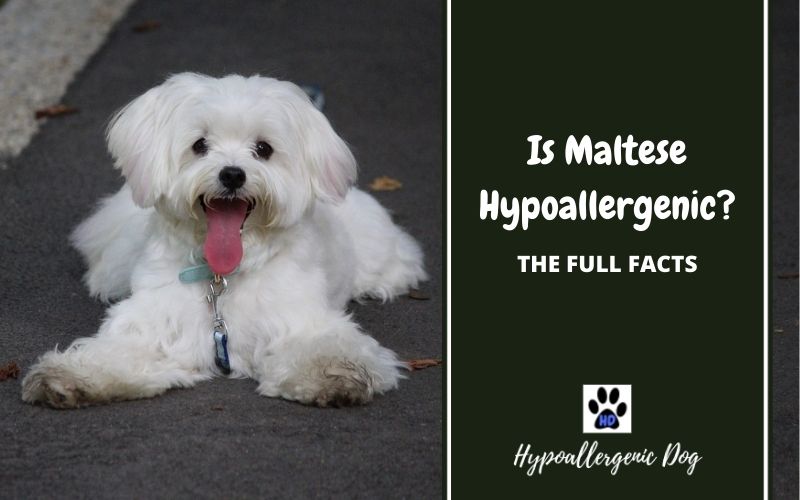Are Maltese Hypoallergenic?
Yes! The Maltese is a small hypoallergenic dog breed that hardly sheds or drools.
The cute, button-eyed Maltese is the prince of toy dogs. As the oldest toy dog breed, this Ancient Dog of Malta is believed to have originated on the island of Malta, of course, and later became a popular pet for royalty. Unlike other breeds who were often bred for working purposes but eventually became companion animals, the Maltese was bred as a companion dog from day one. Today, this hypoallergenic dog is exceptionally popular with small dog lovers. Loyal, loving, and playful, this charming little pooch will steal your heart away!
Maltese can suffer from separation anxiety, and they can be difficult to potty train. Our top recommendations for this breed are this anti-anxiety soundtrack for dogs, and this potty training handbook. Both are backed by money-back gaurantees.
For a quick summary of the Maltese skip to our Maltese dog breed summary further down the page.
Related Breeds: Maltipoo, Yorkshire Terrier, Bichon Frise, Havanese
Discover more small hypoallergenic dogs here.
Are Maltese Hypoallergenic Dogs? Contents
Maltese Quick Facts
About the Breed
Maltese Training and Exercise
Maltese Grooming and Care
Health
Conclusion
Maltese FAQ
Maltese Facts Summary
Maltese Quick Facts
| Hypoallergenic Dog: | Yes! |
| Shedding: | Non-Shedding |
| Drooling: | Low |
| Size: | Small |
| Breed Group: | Toy |
| Lifespan: | 12 – 15 years |
| Energy Level: | High |
| Trainability: | High |
| Family Dog: | Yes! |
About the Breed
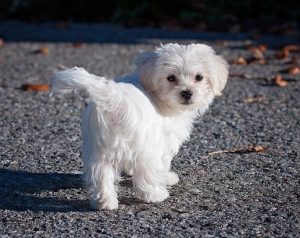
The Maltese Physical Characteristics and Coat
(Skip this section)
The hypoallergenic Maltese is a small, compact dog with a long silky white coat. Variations may include cream or ivory tint around the ears. The Maltese’s bright baby-seal eyes and black button nose help give it the cute appeal that fuels its great popularity.
Maltese dogs stand around 7 to 10 inches high at the shoulder and weigh in at a delicate 4 to 7 pounds. With a sturdy body that runs parallel to the ground.
The secret behind the Maltese dog’s anti-allergy abilities lie in its beautiful white coat. This small terrier’s flowing white locks are composed of hypoallergenic hair. Its hair has a single layer, with no undercoat, and Maltese hair grows straight, without curl or kink.
Not only does this ancient dog of Malta have an allergy resistant coat, but they are also non-shedding, low dander dogs! Shedding fur and dandruff are generally the culprits of the allergic reactions that some people have to dogs … and the lack of these in a Maltese makes them the perfect pet for people with dog allergies.
Maltese Temperament
A lively companion dog, known for its sweet nature, the Maltese’s amiable and obedient nature makes it easy to train, and lovably loyal!
What they lose in their small stature, Maltese dogs make up for in energy, affection, and intelligence. They are wonderful companions as therapy dogs and thrive as a competitor in a wide range of dog sports like obedience, rally, freestyle, and agility.
Being a small lapdog, the Maltese dog thrives indoors, and is suitable for apartment living. It socialises well with other animals and is wonderful with children. Ensure you supervise young children with your Maltese, as they are delicate dogs and your dog or the child could get hurt if a child doesn’t understand how to treat animals gently.
The Maltese is a highly intelligent dog breed. With careful socialisation when they are young, and not over-pampering your dog (as tempting as it may be!), you will have a fine family dog, that is easy to train and eager to please.
Maltese Training and Exercise
Encouraging Good Behavior In Your Maltese

Being an intelligent and inquisitive dog, a Maltese can be easy to train, but it can also use its intelligence for mischief! It’s important to establish yourself as the alpha dog from the start, to grow an obedient and well-adjusted dog.
The Maltese breed certainly isn’t for everyone. Inexperienced dog owners are tempted to think that a small lap dog needs less training and socialization. In fact, due to its small size, the Maltese may be prone to snapping at perceived threats, such as larger dogs and children.
Maltese puppies should be socialized from an early age! Once your puppy is 2-3 months old, and has received its initial vaccinations, it is time to expose him or her to well-mannered dogs and children.
Play biting should always be discouraged with firm, but non-aggressive discipline. Although it may seem cute, your mouthy little Malti is learning the rules it will grow up to live by. Instead of laughing at this nippy little terrier, scold your Maltese puppy in a stern voice, and cease all playful activities immediately. Your intelligent, obedient, people pleasing puppy is sure to catch on quick!
Separation Anxiety and Early Training
As a low maintenance dog breed that hardly sheds, this ancient dog of Malta is the perfect pal for a fireside cuddle. However, due to its history of being bred as a companion animal, your little Maltese is prone to separation anxiety.
Since this breed struggles to cope with loneliness, it’s a good idea to expose a Maltese puppy to brief periods of “alone time”. Leave your puppy in a safe, secluded area for about ten minutes at a time, and always return with a cheerful attitude and a positive tone of voice.
Crate training is an excellent option for keeping your puppy away from danger, and dogs who have been properly crate trained from a young age will often come to love their crates like a second home. If you choose to crate train your Maltese puppy, a hot water bottle or a ticking alarm clock can go a long way towards soothing his or her nerves!
Barking, and How To Avoid It – Are Maltese Dogs Yappy?
Your little Maltese Lion Dog didn’t get its nickname for no reason! Maltese dogs are protective of their owners, and will bark frequently. Don’t let that discourage you from getting this cuddly little hypoallergenic dog breed! It is possible to train a dog not to bark, but it’s much easier if you start from an early age. It may seem counterintuitive, but the best way to train your Maltese puppy not to bark is to first teach him or her to “Speak”!
You can find more Dog Training Tips here (check back soon for this article!). We have included details on how to crate train your puppy, and also some great tips on teaching your Maltese puppy not to bark! Learning some dog training tips will help you and your new Maltese quickly and happily settle into life together.
Exercise Needs
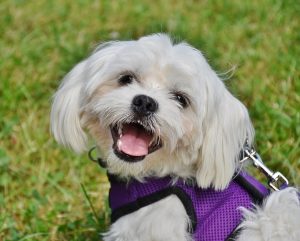
Although they’re quite lively, Maltese dogs only needs up to half an hour of exercise a day. They enjoy a daily walk, and the rest of their exercise can be gained through play. Being a lap dog, the Maltese prefers to spend its free time cuddling.
Unlike larger dog breeds, this pint-sized pup doesn’t need a large house or yard, but it does require a lot of affection and should not be left alone for long periods of time. If you’re struggling with a Maltese that has separation anxiety, we recommend this soundtrack for dogs.
Maltese Grooming and Care
Maintaining Your Maltese’s Coat
The Maltese is a relatively low maintenance breed, when groomed to have a “puppy cut.” The Maltese has non-shedding hair, which is also low dander. Choosing to keep your Maltese dog’s coat clipped short is a great option for those who don’t want to spend time maintaining long hair. You will need to brush their coat once or twice a week, to check it is in good condition.
If you choose to keep their hair long, their long coat of hair rarely sheds, but needs to be brushed daily, to check the hair is free of debris and is not matting.
Regardless of which hairstyle you choose, your Maltese will need to be clipped approximately every 6 weeks. You can do this yourself, or just take your dog to the groomers.
Between visits to the salon, it’s important to keep your Maltese clean. It’s a good idea to wash them every 1-2 weeks, especially if you suffer from allergies! Frequent bathing will help to maintain your Maltese’s hypoallergenic qualities.
However, as a general rule, the best practice is to only wash your Maltese if their coat is dirty. Washing your Maltese too often or with harsh shampoo can lead to skin problems for your dog. Ensure you use a mild, natural hypoallergenic dog shampoo and follow up with a moisturising conditioner.
Tear stains are dark lines under the eyes that often occur with small dog breeds, but you can avoid these by wiping these areas daily.
Maltese dogs tend not to drool, but to maintain a high standard for anyone with dog allergies, it’s recommended to wipe around their mouth as needed. This will remove any saliva and dirt the may gather and certainly help anyone who needs a particularly non-allergenic dog!
A regularly brushed and washed Maltese should not have a strong odor or an oily coat!
Teeth, Ears and Nails
Maltese dogs, like other toy breeds, are known for suffering from health concerns related to poor dental hygiene. Therefore, it is essential that you brush your Maltese dog’s teeth twice a week.
Regularly check your Maltese dog’s ears to ensure they are free of hair, odor, and excess wax, or discolored wax.
All dogs’ nails need trimming regularly! The telltale sign that your Maltese’ nails need a cut is if you can hear them clicking on hard surfaces as they walk.
For information on how to look after your dog, and to get more tips on caring for your Maltese, read this great article on Dog Grooming Tips. (check back soon for this article!)
Health
Maltese Health Issues and Care
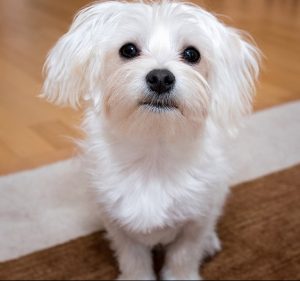
Maltese dogs are generally a hardy breed with comparatively few health problems, although a lot of vet visits are due to injuries related to their small size and fragile build. These dogs aren’t known for being incredibly durable, so be sure to supervise play sessions with other dogs and children!
There are some health issues that often occur in small dogs that may arise in your Maltese:
- Injuries from being a small dog – Keep a close and watchful eye on your little Malti dog, to protect them from falls and other accidents.
- Dental disease – Maintain good oral health by brushing their teeth regularly.
- Ear infections from excess hair blocking the ear canal – Check ears regularly.
- Eye problems may occur from their long hair irritating their eyes – Trim the hair above their eyes or tie it back, to manage this best.
- Skin allergies – Healthy diet and good groomin will help prevent allergies and dry skin.
- Collapsing Trachea that causes chronic coughing – Using a harness instead of a collar will help protect your Maltese from pressure on their windpipe, which can tend to be weak.
- White Dog Shaker Syndrome – A neurological disease can occur in qhite dogs, causing them to shake. This can be successfully managed with medication.
- Patella Luxation – loose knee joints that cause lameness and pain – This will need surgery to correct if your Maltese is in too much pain or begins to become lame.
- Portosystemic Shunts – Liver Shunts – A liver disease that causes toxins to accumulate in some Maltese dogs. Can be corrected with surgery.
Maintaining a healthy diet, regular exercise, high grooming standards, vaccinations and regular health checks with your vet are amongst the best ways to prevent Maltese health problems or to catch them early and treat them. Doing this will help maintain a healthy, happy dog for many years.
Common Health Issues for Maltese
- Dental Disease
- Ear Infections
- Skin Allergies
- Collapsing Trachea
- White Dog Shaker Syndrome
- Patellar Luxation
- Portosystemic Shunts
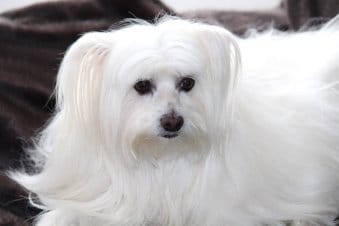
Conclusion
The Maltese is a small hypoallergenic dog breed, well known for its lively, playful nature. Bred as a companion dog, this small non-shedding dog grows a long, silky coat of hair (not fur) that doesn’t shed, making it one of the best dogs for people with allergies. Renowned for their beauty and friendly disposition, it comes as no surprise that the Maltese dog is a popular hypoallergenic pet, and a dog adored by many!
Related Breeds: Maltipoo, Yorkshire Terrier, Bichon Frise, Havanese
Discover more small hypoallergenic dogs here.
Maltese FAQ
Are Maltese Dogs Barkers?
Maltese dogs can bark a fair bit. They need extra training to help regulate their barking. There are some good tips to help your Maltese stop barking here: Maltese Exercise and Training.
Is the Maltese A Good Dog For Apartments?
Being a small hypoallergenic lap dog, the Maltese Terrier is ideally suited to apartment life, or a house with a small yard. Ensure they get enough exercise and fresh air, and make sure you potty train your Maltese so they know where they need to do their business. This guide can help.
Are Maltese Good Family Dogs?
This breed is an excellent choice for single adults, the elderly, or families with older children. Despite their sweet temperament, this breed of dog is very small and fragile, and may nip children that are too young, or too inexperienced to play gently. Ensure you supervise young children with your Maltese, to ensure safe play for all.
Do Maltese Dogs Shed?
Maltese hair is very similar to human hair in that it is non-shedding. It will, however fall out just as our hair does. This can be easily managed with a daily brush, just like we brush our hair. The hairbrush will gather the few loose hairs and you can discard them into the trash. Keeping your Maltese’s hair cut short will also help maintain their coat easily.
What Are The Maltese Pros and Cons?
A properly trained Maltese is a friend worth having! This tiny lapdog is playfully energetic, but easy to exercise with a daily thirty-minute walk!
Low levels of dander, and a beautiful non-allergenic coat of white hair make the Maltese breed perfect for those that suffer from dog allergies. Fastidious people will enjoy this dog’s low-to-no shed coat, and its tendency to not drool.
This small dog may live up to 15 years, but even in old age, it remains intelligently active, playful, and eager to please! The Maltese’s amiable and obedient nature makes it easy to train, and lovably loyal!
These little companion dogs don’t like to be left alone. Be sure to include them in all your activities.
Maintaining their coat is a daily job, especially if you choose to keep it long, and they need to be clipped every 6 to 8 weeks.
If you are considering adding a small hypoallergenic dog into your life, the Maltese hypoallergenic dog may be a wonderful choice!
Maltese Facts Summary
| Breed | Maltese |
| Other Names? | Ancient Dog of Malta, Roman Ladies’ Dog, Maltese Lion Dog, Maltese Terrier (not its correct name!) |
| Hypoallergenic? | Yes |
| Height | Male: 7 to 10 inches / 21–25 cm Female: 7 to 9 inches / 20–23 cm |
| Weight | Male: 4-7 pounds / 3–4 kg Female: 4-7 pounds / 3–4 kg |
| Lifespan | 12-15 years |
| Temperament | Gentle, Playful, Lively, Affectionate, Trusting. Maltese tend to remain lively and playful, even as they get older |
| Colours | White |
| Coat – describe the coat | Non-shedding. Long and silky. No undercoat. |
| How much grooming? | Long coat – brush and comb daily. Short coat – brush and comb twice a week. Bathe every 1 to 3 weeks. Clip every 6 weeks. Clean tear stains daily Brush teeth weekly Clean ears and clip nails regularly |
| How much shedding | Non-shedding |
| Dander levels | Low dander level |
| Saliva – Do they Drool or Lick much? | No drool, but may sneeze when excited. |
| Energy levels | Active |
| How much exercise do they need? | 30 minutes daily |
| Health problems | Prone to dental problems, Patellar Luxation, Portosystemic Liver Shunt, Progressive Retinal Atrophy (PRA), Hypoglycemia, White Dog Shaker Syndrom, Collapsed Trachea, Reverse sneezing |
| Good for apartment? | Yes |
| Suitable for kids? | Mostly good. Some may be snappy with kids. Best to socialise as a puppy if possible. Supervise with small children. |
| How much do they bark? | Constantly, but can be trained to “speak” and be “quiet” |
| Can they be left alone? | Maltese may suffer separation anxiety |
| Intelligent? | Yes. |
| Trainable? | Highly trainable, as they possess a desire to please. |
| How popular as a pet? | Very popular as apartment pet |
| Any other important facts? | Historically it was thought that the Maltese had the ability to cure people of disease and would place one on the pillow of an ill person. The name Maltese Terrier is not the correct name for the Maltese dog, which is correctly called Maltese! |

